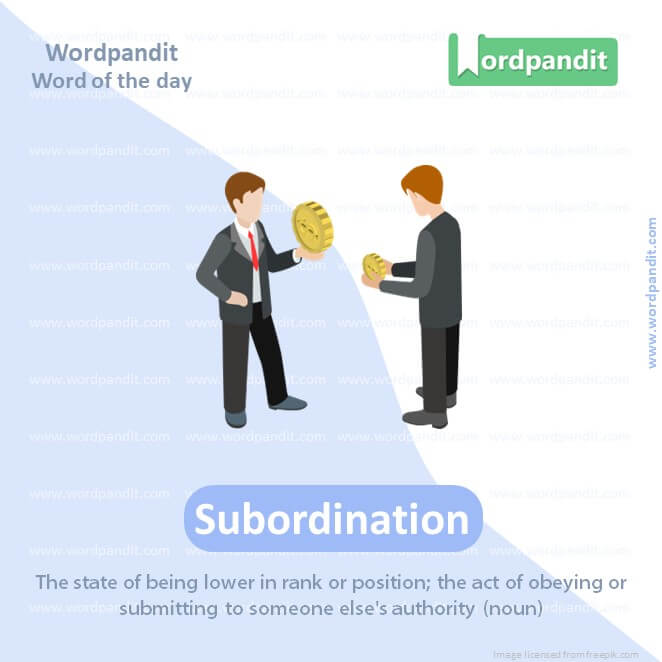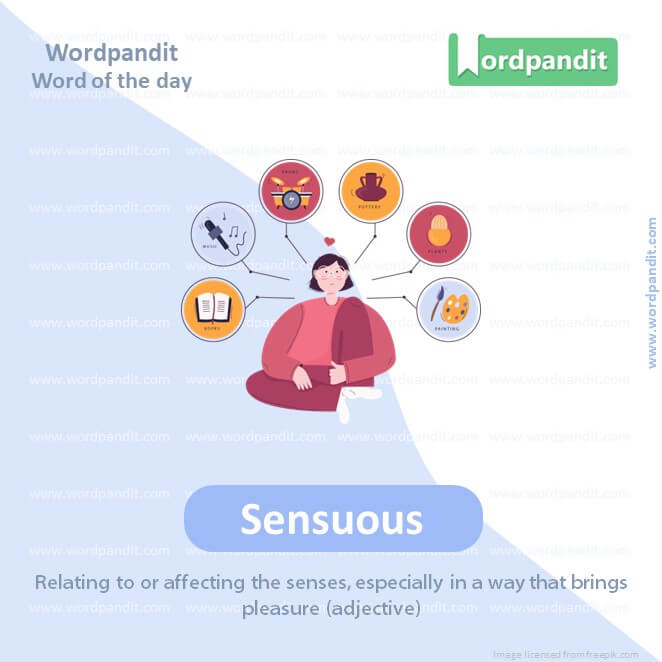Daily Vocabulary Words: List of Daily Used Words in Leading Indian Newspapers
Hi there. Welcome to this special section @ Wordpandit. Our endeavour here is straightforward: highlighting daily vocabulary words that you would come across in leading newspapers in the country. We have included the following newspapers in our selection:
• The Times of India
• The Economic Times
• Hindustan Times
• Mint
• Indian Express
We are putting in extensive work to develop your vocabulary. All you have to do is be regular with this section and check out this post daily. This is your repository of commonly used words; essentially, we are posting a list of daily used words. Hence, this has significant practical application as it teaches you words that are commonly used in leading publications mentioned above.
Visit the website daily to learn words from leading Indian newspapers.

WORD-1: Trail-blazing
CONTEXT: Speaking of the power of women, I am reminded of the trail-blazing role of women in the powerful Bhakti movement, that swept across India between the 9th and the 17th centuries. These remarkable women refused to be straitjacketed in the conventional stereotype of submission, subordination and inferiority.
SOURCE: Hindustan Times
EXPLANATORY PARAGRAPH: Imagine you’re walking in a big forest where there are no paths. If you start walking through the trees and bushes, making a new path, you are doing what we call ‘trail-blazing.’ It means you’re the first one to go that way, like creating new ideas or ways of doing things that no one has done before.
MEANING: Creating new paths or ways of doing things, often in an innovative or pioneering manner (noun).
PRONUNCIATION: trāl-blā-zing
SYNONYMS: Pioneering, Innovative, Groundbreaking, Revolutionary, Trendsetting.
USAGE EXAMPLES:
1. Her trail-blazing research in robotics has won several awards.
2. The company is known for its trail-blazing approach to product design.
3. He was a trail-blazing athlete, setting new standards in his sport.
4. The documentary highlighted trail-blazing women in science.

WORD-2: Straitjacketed
CONTEXT: Speaking of the power of women, I am reminded of the trail-blazing role of women in the powerful Bhakti movement, that swept across India between the 9th and the 17th centuries. These remarkable women refused to be straitjacketed in the conventional stereotype of submission, subordination and inferiority.
SOURCE: Hindustan Times
EXPLANATORY PARAGRAPH: Think about wearing a very tight jacket that doesn’t let you move your arms freely. Being ‘straitjacketed’ is like that, but it’s about being in a situation where you can’t do what you want or can’t be creative because there are too many rules or limits.
MEANING: Restrained or limited in freedom, expression, or creativity (verb).
PRONUNCIATION: strāt-jak-it-ed
SYNONYMS: Restricted, Constrained, Limited, Confined, Inhibited.
USAGE EXAMPLES:
1. The artists felt straitjacketed by the strict guidelines.
2. New regulations have straitjacketed the company’s growth.
3. He felt straitjacketed in his corporate job.
4. The curriculum left teachers feeling straitjacketed.
WORD-3: Stereotype
CONTEXT: Speaking of the power of women, I am reminded of the trail-blazing role of women in the powerful Bhakti movement, that swept across India between the 9th and the 17th centuries. These remarkable women refused to be straitjacketed in the conventional stereotype of submission, subordination and inferiority.
SOURCE: Hindustan Times
EXPLANATORY PARAGRAPH: If you think all dogs like to chase cats just because some do, that’s a stereotype. It’s when you believe that all people or things in a certain group are the same, even though that’s not true.
MEANING: A fixed and oversimplified image or idea of a particular type of person or thing (noun).
PRONUNCIATION: ster-ee-oh-typ
SYNONYMS: Cliché, Generalization, Archetype, Pigeonhole, Typecast.
USAGE EXAMPLES:
1. The movie relied on stereotypes instead of developing unique characters.
2. She challenged the stereotype of the quiet librarian.
3. That joke is based on an old racial stereotype.
4. Stereotypes about teenagers can be harmful.

WORD-4: Submission
CONTEXT: Speaking of the power of women, I am reminded of the trail-blazing role of women in the powerful Bhakti movement, that swept across India between the 9th and the 17th centuries. These remarkable women refused to be straitjacketed in the conventional stereotype of submission, subordination and inferiority.
SOURCE: Hindustan Times
EXPLANATORY PARAGRAPH: Imagine you’ve made a beautiful drawing and you give it to your teacher for a competition. That’s ‘submission.’ It means giving something to someone for them to look at, like a form, a piece of work, or even when you agree with what someone else wants.
MEANING: The act of presenting something for consideration, approval, or judgment; the state of being obedient or compliant (noun).
PRONUNCIATION: səb-mish-ən
SYNONYMS: Presentation, Proposal, Compliance, Obedience, Surrender.
USAGE EXAMPLES:
1. The deadline for the submission of applications is tomorrow.
2. He wrote a poem for submission to the literary magazine.
3. Her submission to the rules was total.
4. The committee is reviewing the submissions for the contest.

WORD-5: Subordination
CONTEXT: Speaking of the power of women, I am reminded of the trail-blazing role of women in the powerful Bhakti movement, that swept across India between the 9th and the 17th centuries. These remarkable women refused to be straitjacketed in the conventional stereotype of submission, subordination and inferiority.
SOURCE: Hindustan Times
EXPLANATORY PARAGRAPH: When you play a game where someone is the leader and others follow their instructions, those following are in ‘subordination.’ It means being in a lower position or rank, or having to obey someone else.
MEANING: The state of being lower in rank or position; the act of obeying or submitting to someone else’s authority (noun).
PRONUNCIATION: səb-ôr-də-nā-shən
SYNONYMS: Inferiority, Obedience, Compliance, Submissiveness, Secondary.
USAGE EXAMPLES:
1. The military operates on a strict system of subordination.
2. In many traditional societies, subordination of individuals is common.
3. The subordination of her interests to his was noticeable.
4. He disliked the subordination required in his new job.
WORD-6: Explicitly
CONTEXT: Andal, regarded as one of the twelve Alvar saint-poets, lived in the 9th century CE in Tamil Nadu. She left behind two works. In the Tirupaavai, a poem of 30 verses, she evokes Krishna by comparing him to the rainfall that produces fertility. Nachiyar Tirumoli, her second and longer work of 143 verses, is much more explicitly sensuous.
SOURCE: Hindustan Times
EXPLANATORY PARAGRAPH: When you tell your friend exactly what you want on your sandwich, with no guessing, that’s being ‘explicitly’ clear. It means saying or explaining something in a very clear and detailed way, without any confusion.
MEANING: In a clear and detailed manner, leaving no room for confusion or doubt (adverb).
PRONUNCIATION: ik-splis-it-lee
SYNONYMS: Clearly, Specifically, Unambiguously, Directly, Plainly.
USAGE EXAMPLES:
1. The rules were explicitly stated in the manual.
2. She explicitly asked for no sugar in her coffee.
3. The contract explicitly outlines the terms of agreement.
4. The teacher explicitly explained the assignment.

WORD-7: Sensuous
CONTEXT: Andal, regarded as one of the twelve Alvar saint-poets, lived in the 9th century CE in Tamil Nadu. She left behind two works. In the Tirupaavai, a poem of 30 verses, she evokes Krishna by comparing him to the rainfall that produces fertility. Nachiyar Tirumoli, her second and longer work of 143 verses, is much more explicitly sensuous.
SOURCE: Hindustan Times
EXPLANATORY PARAGRAPH: Think about when you smell your favorite food or feel a soft blanket. That’s ‘sensuous.’ It’s about enjoying things through your senses like touch, taste, and smell.
MEANING: Relating to or affecting the senses, especially in a way that brings pleasure (adjective).
PRONUNCIATION: sen-shu-əs
SYNONYMS: Sensual, Pleasurable, Lush, Luxurious, Aesthetic.
USAGE EXAMPLES:
1. The painting had a sensuous beauty.
2. She enjoyed the sensuous feel of silk.
3. The music was sensuous and evocative.
4. He described the meal in sensuous detail.
WORD-8: Elusive
CONTEXT: In a dream, she sees herself married to Vishnu, but Krishna remains elusive. Her burning desire for physical contact with him is unconstrained by the dictums of conventional society.
SOURCE: Hindustan Times
EXPLANATORY PARAGRAPH: Think of trying to catch a butterfly with your hands, but it keeps flying away. That’s ‘elusive.’ It means something is hard to find, catch, or achieve, like a butterfly that’s hard to catch.
MEANING: Difficult to find, catch, or achieve; skillfully evasive (adjective).
PRONUNCIATION: ē-loo-siv
SYNONYMS: Evasive, Slippery, Unobtainable, Hard to Catch, Fleeting.
USAGE EXAMPLES:
1. The elusive criminal was finally caught.
2. A solution to the problem proved elusive.
3. The poet’s meaning is often elusive.
4. He was searching for the elusive perfect wine.
WORD-9: Dictums
CONTEXT: In a dream, she sees herself married to Vishnu, but Krishna remains elusive. Her burning desire for physical contact with him is unconstrained by the dictums of conventional society.
SOURCE: Hindustan Times
EXPLANATORY PARAGRAPH: Imagine your teacher has rules like ‘no running in the hallways.’ These rules are like ‘dictums.’ A dictum is an important statement or rule that you’re supposed to follow.
MEANING: Authoritative statements or decrees; formal pronouncements from an authoritative source (noun).
PRONUNCIATION: dik-tuhms
SYNONYMS: Decrees, Edicts, Commands, Pronouncements, Directives.
USAGE EXAMPLES:
1. The judge’s dictum set a new legal precedent.
2. His dictums on the subject are well respected.
3. The company operates under several basic dictums.
4. The old philosopher’s dictums were remembered by his students.
WORD-10: Unconstrained
CONTEXT: In a dream, she sees herself married to Vishnu, but Krishna remains elusive. Her burning desire for physical contact with him is unconstrained by the dictums of conventional society.
SOURCE: Hindustan Times
EXPLANATORY PARAGRAPH: Imagine being able to play however you want in a big playground without any rules. That’s being ‘unconstrained.’ It means you’re free to do whatever you want without being stopped or limited.
MEANING: Not restricted or limited; free (adjective).
PRONUNCIATION: un-kən-strānd
SYNONYMS: Unrestricted, Unrestrained, Free, Uninhibited, Unbridled.
USAGE EXAMPLES:
1. Her imagination was unconstrained by reality.
2. They enjoyed unconstrained conversation.
3. The artist’s style was bold and unconstrained.
4. In his retirement, he enjoyed an unconstrained lifestyle.
vocabulary cards
In the realm of language learning, an individual’s arsenal is incomplete without the essential tool of ‘vocabulary cards.’ Vocabulary cards, also known as flashcards, are a potent method to imprint new words, phrases and their meanings into our memory. They have been used for centuries for their effective learning approach and cognitive retention benefits.
Vocabulary cards are typically designed with a term on one side, and its meaning or translation on the other. This learning tool engages our brain’s active recall, a vital process in long-term memory imbibing. However, these vocabulary cards should not just be seen as standalone pieces of paper; they are keys to unlocking the treasuries of new languages.
To harness the best results from vocabulary cards, one must follow a planned method. Firstly, the words and phrases should be relevant to the learner’s requirement. Niche words about the user’s profession or daily life activities are particularly profitable choices. Secondly, incorporate these flashcards into regular study routine to ensure consistent revising. It is suggested to do short, multiple study sessions throughout the day, rather than one long session.
Another significant factor in learning vocabulary cards is the Leitner System, an age-old method of spacing the revision of cards based on the learner’s proficiency. The cards that are difficult to remember should be reviewed more frequently than the ones that are easier.
Utilizing vocabulary cards provides a hands-on approach, reinforcing knowledge with each use. It helps learners to interact with the language, promoting better understanding and long-term retention. As such, vocabulary cards are far more than simple learning aids; they provide a comprehensive system for enhancing vocabulary, setting learners on the fast track to language proficiency.
In conclusion, vocabulary cards’ value should not be underrated. Explore these smart flashcards and begin your journey towards linguistic mastery consistently and effectively.













